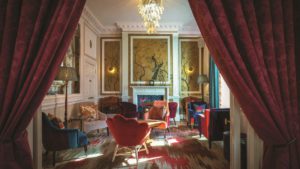London, a petri dish of persons with a certain ‘je ne sais quoi’, at times feels like the epicentre of the universe. Whatever your niche, you can find the crème de la crème of your community in the capital.
Private Members’ Clubs, born in 17th century England as coffee houses, are the ultimate conduit of this magic. Curating communities so members can always sit next to someone they’d be interested in talking to. What started as a culture of quiet luxury has quickly U-turned as social media has thrust this once low-key endeavour into the spotlight. Private members’ clubs are not so private anymore.
Clubs’ recent explosion in visibility and accessibility has whipped this demand into a frenzy as Investors and would-be socialites look to cash in on clubs’ valuable social caché. Establishments are popping up across the capital catering to the largely younger audience. New entries to the foray include similar offerings of partying, eating and canoodling, gift-wrapped in diverse interiors.
Yet, surely people yearn for something more meaningful?
Sensing an oversaturation, a new breed of club is growing in popularity – members’ clubs to enhance the lives of a niche community.
Take The Dally , North London’s first female-founded member’s club. The Dally fosters local socialising to create a deep sense of community. Housed in a three-story townhouse, The Dally offers a welcoming space designed to encourage conversations, events, and local engagement. Membership is open to anyone with a connection to the neighbourhood.
Also, the Curve Club , located in Shoreditch. Founded by a fully female team, it focuses on fostering a community of founders and entrepreneurs by combining digital and physical experiences. It provides a luxurious space for private dinners, parties, celebrations, meetings, brand launches, and more, in a 200-year-old fire station.
And then the Dulwich Darlings. The tongue-in-cheek brainchild of Dulwich’s yummy mummies, after a modern take on the WI to empower women in a way that’s relevant to their specific community.
These new iterations offer fun, creative solutions that are neither over-clever nor over-played. Something simple, yet effective. Community-focused innovation creates real value for members.
But innovation isn’t always a blessing. Amongst the new gen you’ll notice the likes of ‘Meme-bers’ clubs’ spawned by social media fandom. Garnering huge online followings from posting memes about being posh, they capitalise on this success by selling apparel and throwing private parties. Whilst their marketing prowess is to be applauded, they’re ultimately let down by a lack of substance. They bill their communities as 21st Century Sloane Rangers, but only succeed in becoming a parody of themselves – posting about hunting, selling quarter zips, and organising not-so-exclusive booze fests for people with little in common beyond a desire to appear rich. This is not a real community. It feels like a gimmick. The irony is not lost on us.
More trouble broods in Clubland Paradise. Many of London’s most popular clubs are yet to turn a profit. With some major institutions posting losses as high as £100m+ in 2023, they seem to be taking the Silicon Valley approach of scale and optimise. A ballsy strategy that, when coupled with the boom in social media use, has led to a flood of darling creative socialites. A flood that now brings a second issue – they’re too full. Overcrowding plagues these venues with members feeling more sardine than aristo. So much so, they’ve paused new memberships for the foreseeable.
And then there are mega clubs. In the 60s, Annabel’s was founded on the need for luxurious privacy. It was designed to feel like a sitting room – but a sitting room with a European monarch perched on the footstool. Annabel’s is now London’s most sought-after social ticket. This club is exclusive, an amazing party, beautifully decorated and maintained, and unfortunately struggling to meet profitability following an enormous renovation and relocation. I won’t critique the financial strategies of London’s most beloved clubs – their popularity speaks for itself. But I worry for the future of these mega clubs given the enormous cost of upkeep. Can this market really accommodate clubs of this size?
Exclusivity is a timeless currency. For over 25 years now, the beautiful Home House has capitalised on this, hosting many of London’s most glamorous revellers. Easily in the running for the capital’s most architecturally striking club building, it was built 250 years ago to be a sophisticated palace purely for enjoyment and entertainment. Home House is to this day one of the most successful and tasteful clubs from the new age, perpetuating its popularity and profitability over decades.
Having seen the demand for clubs that bring together communities, but understanding the issues facing the new-gen clubs, Home House founders answered these concerns with a previously unseen model.
Home Grown Club is a private members club for those seeking investment to scale up, and those looking to invest. With over 1,500 members from all over the world, it is the world’s most important business club. And last week they celebrated their 5th anniversary after half a decade of incredible success.
Home Grown has successfully catered an experience that proprely serves the needs of a niche community. In business we care about transformation. Home Grown facilitates the relationship building of the business world’s next elites. Providing a space that people want to be in thanks to its Britishly eccentric, gorgeous, maximalist interiors. Based in Marleybone and calling a grade 2 listed Georgian Townhouse home, this club feels like stepping into the bones of what’s made Britain so great these last 200 years. You’re becoming a part of history, and what better a place to forge history through the means of business deal-making.
It’s aspirational, community-focused and importantly it caters to the needs beyond that of meeting rooms and coworking desks. Entrepreneurs looking to raise a million do not need co-working desks, they want striking meeting spaces to swoon investors and clients, and somewhere cosy to work while they wait. They don’t want London’s plentiful, sterile, multi-purpose function rooms.
“Home Grown is the only club in London that is dedicated to the art of entrepreneurship. Others pay lip service to it but do not feature it as their main purpose”- Stephen page, CEO of SFC Capital
London’s party scene is oversaturated. Big money can pile in, but clubs need to offer more than debauchery alone. To really cement their position in the capital they need to build spaces that truly cater to the needs of niche communities – meaningful events and experiences, and amenities that catalyse members’ efforts and help them realise their ambitions.
Burgeoning meme-bers clubs amongst the Gen Z well-to-dos need to create a more serious offering beyond playing make-believe, moving past and cheap laughs.
Home Grown Club stands out as a stark reminder of what matters in Clubland. Despite being only 5 years old, its membership far surpasses that of clubs decades older. Its membership brims with high-quality movers and shakers set to move the needle on the business world’s dial. It goes a step further. Home Grown is the conduit to career success so many entrepreneurs desire. But, whisper it out loud: YES you can have a lot of fun at Home Grown too. The place is precision-engineered for fun.
For all its sins, London’s Clubland is booming. And as history repeats itself, London’s influence remains a global cultural force. But with venues popping up everywhere, and big money dominating the picture, over-saturation is a problem. This landslide of investment into the space has spawned party dens that are overcrowded imitations of real exclusivity.
Clubs that only succeed in parodying a culture they seek to appropriate, whether that’s for a quick buck or to wedge their attendees in a perceived social sect, will inevitably die out as the joke wears thin. Something the titans and the meme-bers clubs have in common.
There is hope, however, as evidenced by Home Grown. Clubs that create meaningful communities to empower their members to flourish are timeless institutions.
By curating a membership of under-served like-minded individuals, you’ll create the fertile grounds for a club that serves its primary purpose – to connect those of shared interest.
_________________________________________________________________________________________________________________________________________________________




